The new reign in Spain shows how we need to start thinking about the future of the British monarchy in Canada
Jul 13th, 2014 | By Ashok Charles | Category: Canadian Republic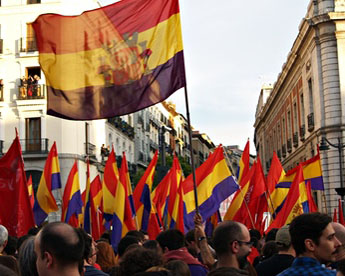
Crowds waving republican flags gather in Puerta del Sol in Madrid, early in June 2014. They called for a referendum on the Spanish monarchy after King Juan Carlos announced his plans to abdicate. Photograph: Ignacio Luna/Demotix.
Last month’s abdication of King Juan Carlos I of Spain in favour of his son triggered a fierce debate on the future of monarchy in Spain. It also brought out tens of thousands of republicans to rallies in Madrid, Barcelona, and other cities. The rally in the capital drew 20,000 and solidarity rallies took place in 30 cities across Europe and in Latin America. Leftist political parties in Spain are clamouring for a referendum on whether to retain the monarchy. A petition calling for a referendum quickly accumulated 113,000 signatures.
There are good reasons for Canadians to consider and debate the implications of an upcoming transition in our own monarchy. Queen Elizabeth II is 88 years old, and the assumption of her role as our head of state by her son will be a matter of mortality rather than abdication, but otherwise the same issues are raised – democracy, egalitarianism, and political evolution.
Cayo Lara, who heads Spain’s United Left coalition, lamented : “It’s inconceivable in the 21st century that we’re still talking about blood rights.” Referring to the monarchy as “an anachronistic institution,” he noted that the question at hand is “about whether we want to deepen Spain’s democracy.”
There is solid evidence that Canadians, too, are open to the idea of ensuring our present constitution’s commitment to egalitarian democracy ceases to be compromised by deference to a colonial, monarchical past. A 2010 Angus Reid poll suggested 52% of Canadians are in favour of reopening constitutional debate to discuss the possibility of replacing the British monarch with an elected Canadian head of state. Only 32% were opposed.
Other recent opinion polls document a growing popular scepticism about the future of the monarchy in Canada:
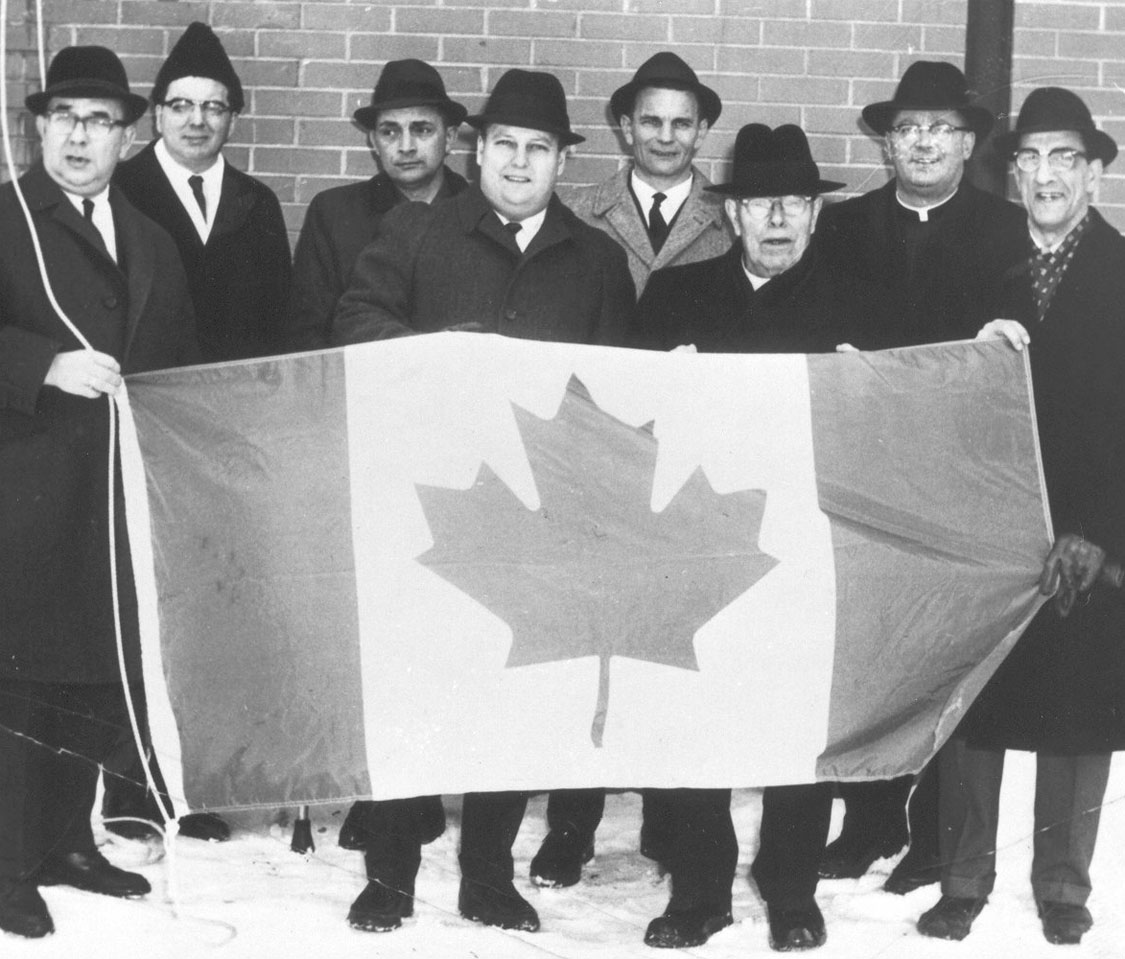
Residents, of Field, Ontario (between Sudbury and North Bay) celebrate the birth of the independent Canadian flag, February 15, 1965.
*Â JUNE 2012 – A poll commissioned by the organization, Your Canada, Your Constitution, and conducted by Harris-Decima, revealed that 67% of Canadians would support a new, elected position to replace the Governor General and lieutenant governors [currently appointed by our federal prime minister, to ‘represent the Queen’]. Regionally, there is support across all provinces with the highest support in Alberta and Atlantic Canada.
* NOVEMBER 2012 – “A new national poll commissioned by the Montreal-based Association for Canadian Studies examined the pride Canadians place in a list of more than a dozen symbols, achievements and attributes.” It “found universal health care was almost universally loved, with 94% calling it an important source of collective pride … At the other end of the spectrum, just 39% of respondents felt the monarchy was a source of personal or collective pride, while 59% were royally unimpressed … ”
* FEBRUARYÂ 2013 –A poll commissioned by Your Canada, Your Constitution, found that 55% of Canadians want to see change in Canada’s office of head of state and that only 34% want a British royal family member to continue to hold the office.
* JUNE 2014 – In an online survey conducted ahead of Canada Day by Leger Marketing, for the Association for Canadian Studies, respondents were asked to rank 11 items in terms of whether they help unite Canadians. The Canadian Charter of Rights and Freedoms came in first, with 25% of respondents voting for it. Universal health care came second, with 22%, followed by Hockey, with 12%, Multiculturalism, with 9%, and (once again bringing up the rear), “The monarchy” with a mere 2%!
This year’s Canada Day edition of the Globe and Mail included an article by the career diplomat, Paul Heinbecker, entitled “The monarchy hurts Canada’s standing in the world. Its time to let go.” The piece began, “Fealty to the British monarchy is an anachronism and a drag on Canadian foreign policy that confuses many and delivers little.” Mr Heinbecker went on to outline the ways in which Canada’s international reputation and representation suffer through our acceptance of a British royal family member – who will inevitably put Britain first – as our head of state.
* * * *
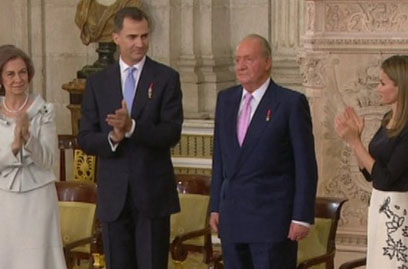
Former King Juan Carlos of Spain is applauded by his wife, son, and daughter-in-law, after he signs his act of abdication, in favour of his son,June 18, 2014.
It is not difficult to understand why enthusiasm for the monarchy in Canada is waning. First and foremost, the institution is profoundly undemocratic and un-egalitarian.
Secondly, the assignment of our highest government office to a British family, and the oath the chosen member of this offshore family swears on assuming the crown, to preserve the Church of England and maintain the Protestant religion, conflict with our commitment to multiculturalism.
In short, the monarchy is incapable of representing the values Canadians have embraced and which are enshrined in our Charter of Rights and Freedoms. Actually, the monarchy does a fine job of embodying values Canadians of the 21st century have rejected –Â hereditary privilege, undemocratic governance, inequality, and cultural and religious discrimination.
Spanish monarchists hope that the crowning of the King’s fairly popular son, Felipe, will allow the monarchy to survive. Canadian monarchists hope that a King Charles in some not too distant future will accomplish something similar here. A couple of factors, however, make the prospect of King Charles of Canada less palatable to Canadians than King Felipe is to Spaniards.
First of all, Charles is not as popular as Felipe. An Angus Reid poll, conducted in 2012, found that only 17% of Canadians want a King Charles. And just this past spring, the Toronto Sun conducted a poll during a visit by Charles and Camilla, in which 76% of respondents felt that the $720,000 bill to Canadian taxpayers for this particular royal tour was “way too much”!
Secondly, while Felipe is, at the very least, a resident Spaniard, Charles, like British monarchs before him since Henry VII, thinks Canada is a nice place to visit but wouldn’t want to live here.
Charles’s automatic accession to our highest symbolic government post, when he assumes the throne in Britain, would highlight Canada’s failure to fill and administer its own office of head of state. No other member nation of the G8 outsources its highest formal government office. In the G20 only Canada and Australia share this ignoble distinction.
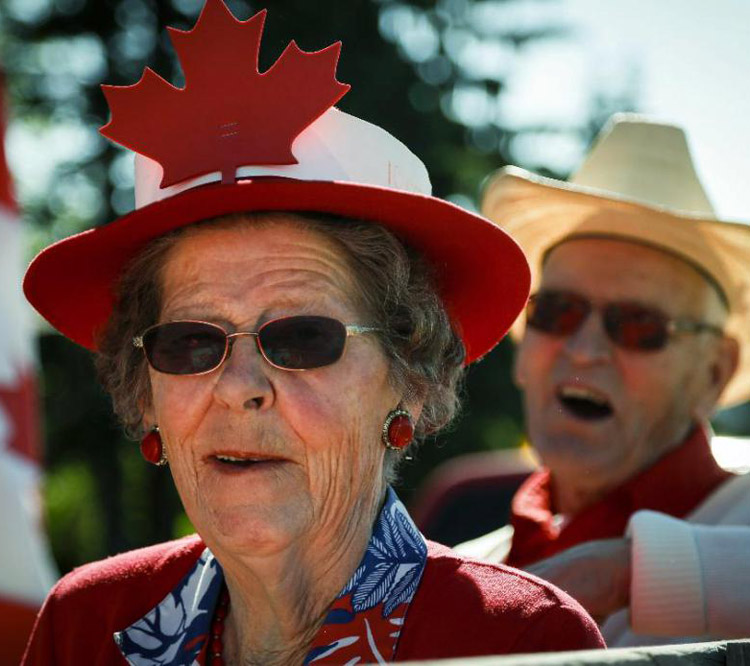
Lita Reid, left, and her husband Allan at Canada Day celebrations in Cremona, Alberta, Tuesday, July 1, 2014. Jeff McIntosh / Canadian Press.
Although, the time frames are different, Canada, like Spain, is anticipating a historic transition in its monarchy. In Spain, the impending abdication has prompted serious debate and an outpouring of public sentiment – much of it calling for an end to monarchy.
Canada, too, ought to be responsive to its coming royal transition.
Republican rallies may not be taking place across the country – yet. But in our current circumstances the federal government ought to be initiating a nation-wide exploration of our future relationship with the British monarchy.

A fan waves a Canadian flag as the crowd celebrates Canada Day, during interleague action between the Toronto Blue Jays and the Milwaukee Brewers, in Toronto. Tuesday July 1 , 2014. Chris Young / Canadian Press.
Constitutional experts should be assessing our available options. Citizens’ forums and town halls should be probing the will of the Canadian people. Eventually, no doubt, some kind of federal-provincial conference should be held. Perhaps a national referendum is called for to aid in deciding whether Canada should preserve its link to the British monarchy. (And, as Paul Heinbecker has recently stressed, before everything else, “we should elect a government willing to make these changes”!)
No self-respecting nation should blithely accept a new head of state, for life, solely on the basis of a hereditary succession in another country.
Ashok Charles is the executive director of Republic Now || République du Canada. He can be reached at director@republicnow.ca ; or #419-110 Cumberland St., Toronto, ON. Canada. M5R 3V5.

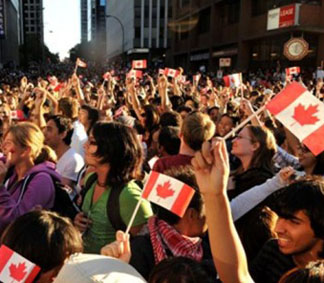
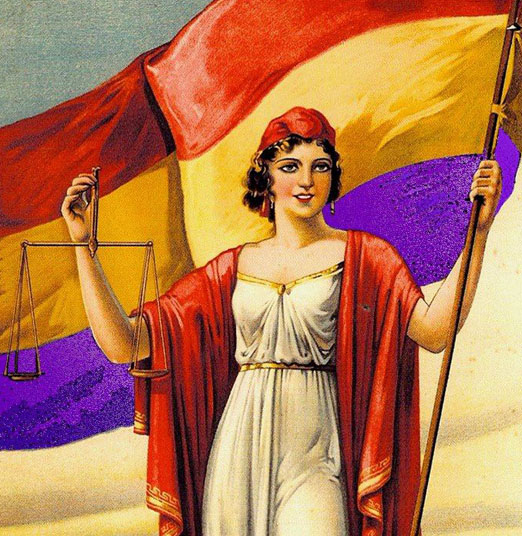
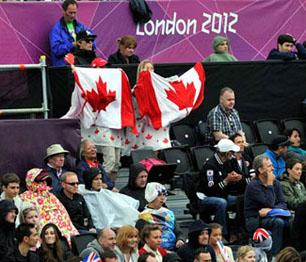
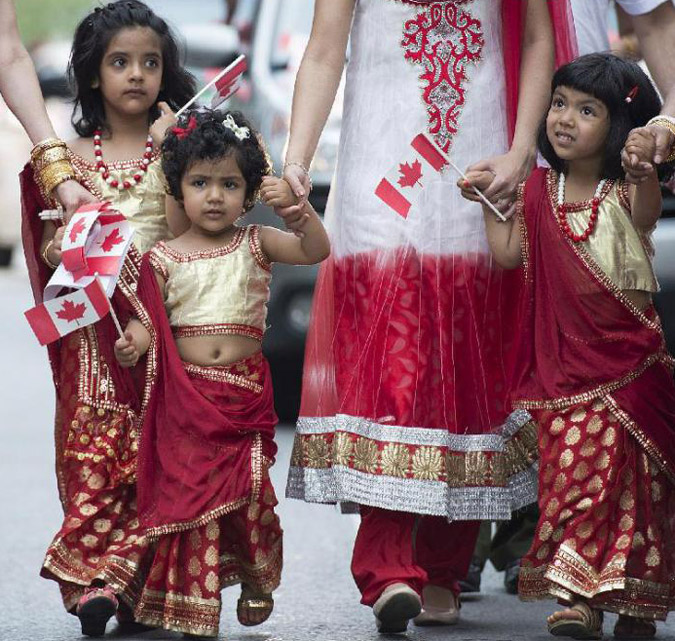


very nice article Ashok -best wishes for every success with the Republican movement in Canada.
Watch out for the results of the Scottish referendum mid-September –
if Scotland votes YES the momentum may move a referendum forward even in Canada!